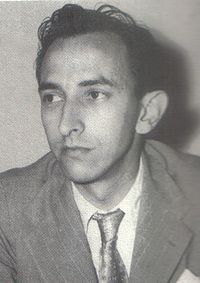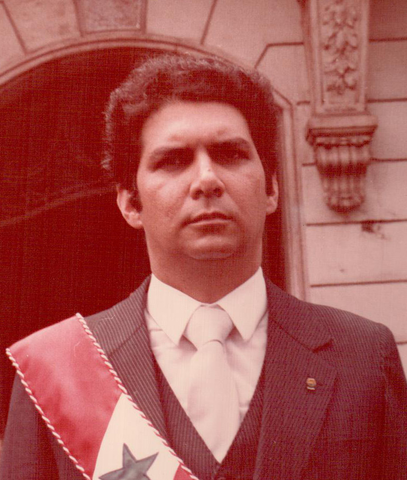------------------
Part 7: Creative Accounting
In a country where large parts of it were under the direct control of private groups and oligarchies for centuries, with the state having almost no power in many areas and sometimes entire states, it is not surprising at all that Brazilian politics could be extremely corrupt, something that was exacerbated by the rise of multiple authoritarian regimes throughout the history of the republic. The 1964-85 dictatorship did as much as it could to worsen this issue, thanks to the lack of accountability, the lack of democratic elections to many important offices and high levels of censorship: politicians like ACM, José Sarney and Paulo Maluf owed much of their current power and status to the bygone regime, and another noteworth case that displayed the incompetence of the dictatorship in this front (not that they were ever decent in other spheres either) was the appointment of Haroldo Leon Peres, a lawyer and congressman whose career was dogged by suspicions of unethical practices, to the governorship of Paraná in 1970. As governor, Peres was ousted after being in power for just seven months after being caught on tape trying to extract a one million dollar bribe out of a construction company (1).
As active members of this greasy system, it was inevitable that the progressive parties too would find members who would indulge in these practices, no matter how hard some of them, especially PT, tried to frame themselves as completely pure, incorruptible and moralistic groups (2). Although many of them would dismantle political machines and clientelist networks that dominated their municipalities and states for decades (like governors Waldir Pires in Bahia and Jackson Lago in Maranhão), a growing number of them would find it irresistible not to abuse their power for their personal benefit, aware that many of their more serious misdeeds would be shielded from the public eye by
TV Brasil. As some of these characters would become more and more powerful as time went on, it became more convenient for local and national party leaders to simply ignore their activities, for expelling them would bring some very bad PR for them, and the crooks could always somehow retaliate.
Or, at least, that's what they thought. Some things are just too big to be kept under the rug for long.
The hot-headed and controversial Arthur Virgílio Neto (PSB-AM), governor and later senator from the state of Amazonas.
The first noteworthy progressive figure to be suspected of engaging in shady practices was the then governor of Amazonas Arthur Virgílio Neto. Son of the famous senator Arthur Virgílio Filho, who was forced to resign by the dictatorship in 1969, Neto had become a highly polarizing and controversial figure thanks to his aggressive, confrontational and often insulting way of playing politics, with a famous example of this behavior being when he called Lula, a fellow leftist, a "sad, bitter and illiterate fool" in the first round of the 1989 presidential election, though he later apologized for his remark (3). Shortly after defeating his opponent Amazonino Mendes in a tough, close race for the governorship in 1986, Virgílio was accused of receiving secret, illegal donations from multiple companies, something that allowed him to defeat his opponent, who was bolstered by the state apparatus commanded by Gilberto Mestrinho. Though the investigation into his campaign ended without any major bombs or spectacular arrests, it did much to undermine his popularity, though he would eventually recover and become one of PSB's most important members, winning a second term in the governorship and later winning a seat in the Senate (4).
If we were to list every single scandal that took place in the Brizola Administration, we would be sitting here all day and wouldn't be able to talk about half of them. Thus, we'll focus on the big ones, those that had national repercussions, the first of them having to do with one of the most prevalent styles of corruption: bribery and overpricing by construction companies. As the federal government began its ambitious program to refurbish its hospitals, schools, roads, bridges and railways, as well as build new ones with the collaboration of its state and municipal counterparts, swarms of entrepreneurs gathered every time a new project was elaborated, hoping to be awarded the honor of turning said project into a reality, along with the very juicy contracts that came with it. As thousands of such auctions were held, one single, mighty conglomerate stood above the rest as the winner in most of them: Odebrecht. Founded by the Recife-born businessman Norberto Odebrecht, great-grandson of the German engineer Emil Odebrecht (who moved to Brazil from his homeland in 1856), in 1944, it grew into one of the largest companies of its type in Brazil, and Norberto one of its richest men.
As time went on, it was found out by either journalists, ambitious prosecutors or simply people that were in the right place at the right time (or wrong, depending on your point of view) that Odebrecht and similar conglomerates, like Camargo Corrêa and Andrade Gutierrez, won many of their contests by bribing officials from multiple spheres of government (local, state and federal) with enormous sums of money, with the contracts later being grossly inflated to make up for their loss. These multiple schemes, which occurred in one way or another in every single state of the country, cost the federal government hundreds of millions, and eventually billions, of cruzados that could have gone to other areas that desperately needed them. Multiple politicians everywhere would be implicated, the highest ranking of them being governors like Celso Daniel (PT-SP) and Arthur Virgílio Neto, or senators like Roberto Requião (PSDB-PR) and Élcio Álvares (PDS-ES), a member of the opposition, the mentioned ones all either evading justice or being acquitted due to lack of evidence (5).
The Arco Metropolitano (Metropolitan Arch), a road that links the cities of Maricá and Itaguaí in Rio de Janeiro, cost Cz$ 1.5 billion to be built (6).
However, these misdeeds were shadowed by a scandal that would strike deep into the heart of PTB in its mightiest stronghold, the city of Rio de Janeiro. In March 1992, with that year's municipal elections right around the corner, an enormous bombshell was dropped, one that turned the Marvelous City's politics upside down overnight. A massive scheme that diverted millions of cruzados from funds that were supposed to go to healthcare was discovered, and multiple petebista and even some opposition councillors, such as Jorge Picciani and Jorge Pereira respectively, were indicted and later arrested because of their connections to it (7). An especially flashy part of the scheme was the illegal sale of large amounts of blood products, which earned it the popular nickname of "Caso dos Vampiros" ("The Affair of the Vampires"), something that was especially damaging to the incumbent mayor Miro Teixeira, for although he wasn't directly implicated in it, his challenger, Sérgio Cabral Filho, made a big show about nicknaming him "Miro, o vampiro" ("Miro, the vampire") and the nickname stuck.
That alone would have been bad enough had the police investigating the whole thing not stumbled into a mountain of evidence that linked PTB-RJ to some unsavoury characters in the very dirty world that was dominated by the carioca samba schools. Many of them, such as Beija Flor, were quite active in politics, and had links to organized crime and the drug trade. It is therefore unsurprising that they had many links to the state government, which was almost completely dominated by PTB, and regularly commited crimes like money laundering and many other things. The real bombshell here was the fact that they often secretly (and illegaly) donated large sums of money to help multiple PTB candidates in their races, whether they were local or statewide, legislative or executive, in a series of dirty deals that stretched from the first days of Brizola's governorship until they were finally discovered and brought to the public eye (8).
Despite
TV Brasil's best efforts to first obfuscate and then later minimize the full extent of the corruption that was plaguing the state of Rio de Janeiro, it couldn't keep the president's approval rating from plummeting from around 70% in February/March to approximately 45% in June, a stunning 25% drop in just a few months. Though the Old Caudillo's numbers were still pretty high, especially when compared to his predecessor's, a proof of just how powerful
TV Brasil had become as well as the president's charisma, the scandal and its fallout suddenly made a lot of races that were almost guaranteed to be leftist victories into tough contests that could be won by the rightist parties. Its effects would be felt for many years to come, since a great many politicians' careers were either blown to smithereens or brought to new heights because of it.
------------------
Notes:
(1) A practice that still exists today, as we all know.
(2) Before the
Mensalão happened, the
petistas were extremely obnoxious about showing just how honest and ideologically pure they were, something that alienated potential allies like Leonel Brizola and his PDT.
(3) IOTL, Arthur Virgílio Neto started his career as a progressive politician before becoming a hardcore right-winger and member of PSDB. In 2005, while he was a senator, he said he was going to beat president Lula up. As you can see, he's still an asshole, but a leftist one.
(4) He later admitted to receiving these donations IOTL. So he's not just an asshole, he is also a corrupt one.
(5) All of the people mentioned here got into some sort of trouble with the law IOTL. Requião was accused of nepotism and did an extremely dirty trick in the 1990 Paraná gubernatorial election (), Virgílio's character and past have already been laid out, Álvares was accused of having links with organized crime in Espírito Santo, and a former secretary of Celso Daniel (before the mayor himself was murdered in 2002) was arrested in 2018.
(6) The Arco Metropolitano was built during Sérgio Cabral's horrible tenure as governor. It cost 1.5 billion reais to be built, and most people are afraid of traveling on it, since it's a very unsafe area, with more than 200 robberies taking place there in 2019.
(7) I don't need to go on about how awful Picciani is, but the other guy, Jorge Pereira, was once an extremely powerful player in Governador Island, since he ran a vote buying scheme that lasted many years and benefitted not only him, but also his wife, Graça Pereira, and the couple's son, Jimmy Pereira.
(8) For those who are confused, the scandal is like this: local scandal regarding healthcare funds --> statewide donations scandal involving samba schools and a
lot of PTB politicians. And since Leonel himself governed RJ for four years, it's going to hit him just like Lula was hit by the
Mensalão, even though it's a state scandal, not a national one.







